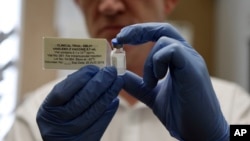Researchers say an experimental Ebola vaccine has caused no serious side effects and produced an immune response in all 20 healthy volunteers who received it in an early-stage clinical trial.
The New England Journal of Medicine said Wednesday that scientists will continue to follow the volunteers for another 48 weeks in the study that began on September 2.
The trial's aim is to determine the safety of the vaccine, produced by British firm GlaxoSmithKline.
The news comes a day after the World Health Organization said the ongoing Ebola outbreak in West Africa has killed nearly 5,700 people out of some 16,000 cases.
The chairman of Global Vaccines at GlaxoSmithKline, Dr. Moncef Slaoui, said the company was encouraged by the positive first trial results, but added, "It's important to remember that these data are the first piece in the jigsaw."
Dr. Anthony Fauci, the director of the U.S. National Institute of Allergy and Infectious Diseases (NIAID), said “The safety profile is encouraging, as is the finding that the higher dose of vaccine induced an immune response."
NIAID developed the vaccine with Okairos, a biotechnology company acquired by GlaxoSmithKline in 2013. The trial was conducted by the U.S. National Institutes of Health, of which NIAID is a part.
GSK has been working with the NIH to accelerate development of another possible vaccine targeting just the Zaire strain in response to the current Ebola epidemic. The Zaire-only vaccine is undergoing safety trials in England, Mali and Switzerland.
Next phase to begin in early 2015
Slaoui says if the results from the trials are positive, the next phase of the clinical trials will begin in early 2015 to see whether "the immune response seen in phase 1 actually translates into providing people... with meaningful protection against Ebola."
GSK says phase 3 trials would involve the vaccination of thousands of volunteers, including frontline healthcare workers in Liberia and Sierra Leone, and possibly Guinea.
Meanwhile, U.S. based pharmaceutical giant Merck announced Monday an agreement to research, develop, manufacture, and distribute another possible vaccine currently being evaluated in Phase I clinical trials. The vaccine candidate was developed by the Public Health Agency of Canada (PHAC).
Additional Phase I studies are underway or planned for the Merck candidate vaccine. They are slated to begin in the near future at clinical research centers in Switzerland, Germany, Kenya, and Gabon in a World Health Organization-coordinated effort, and in Canada by the Canadian Immunization Research Network.

